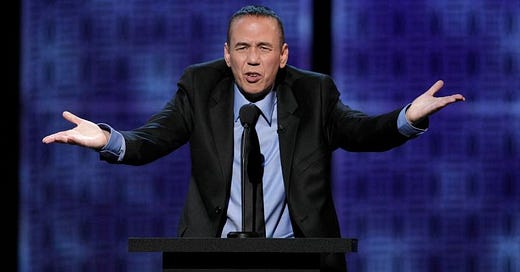Author’s Note: This is our second article this week. Our first, which challenged the claim that “real” New Yorkers root for the Yankees, was published in the New York Sun. If you did not previously hit the link, please do. ‘Can’t Anybody Here Play This Game?’ It’s free, and we think it’s worth reading. Just enter your email to access it.
During the formative years of his career, the late Gilbert Gottfried had one particularly idiosyncratic routine. In the middle of a crazed monologue whose logic only he could follow, Gottfried would suddenly come to an abrupt stop, don a pair of thick glasses and, in his inimitable voice layered with an exaggerated Jewish accent, self-deprecatingly ask the audience: “So where’s the humor?”
Gottfried’s question could not be more timely in a Presidential campaign that has been nasty, ill-mannered, and anything but humorous. Its timeliness was brought into sharp relief by last weekend’s monologue at Donald Trump’s Madison Square Garden rally by “insult comic” Andy Hinchcliffe, who likened Puerto Rico to a “floating island of garbage.”
While unquestionably insulting and tasteless, the joke, from a comedy purist’s perspective, suffered from a more serious flaw: it just wasn’t funny. The sound of the Garden crowd’s reaction, audible from the broadcast, was familiar to anyone who has ever attended a nightclub comedy show. It was the sound of a comedian bombing. Hinchcliffe’s defenders have challenged his critics by arguing “he’s an insult comic, what did you expect?” The answer, one imagines, is that the audience expected some comedy to accompany the insult.
While humor in our presidential campaigns has been waning for years, if not decades, its absence in this election has been particularly pronounced. Kamala Harris laughs a lot, but she is rarely, if ever, funny. The better case can be made for Donald Trump, but his humor, much like his predecessor’s, tends toward the mean-spirited, exacerbating rather than diminishing this country’s divisions.
Once upon a time, politicians could tell, and take, a joke. For example, increasingly overlooked by history is the fact that Ronald Reagan, remembered now for his steadfastness in the Cold War and for his principled conservative convictions, was a very funny man. His quip about Walter Mondale’s youth justifiably lives on, but it overshadows how effectively Reagan otherwise used humor to advance serious political arguments.
His comment, "Most people would be glad to mind their own business if the government would give it back," perfectly captures the mood of many Trump supporters on the eve of this election and is likely more persuasive than the inflammatory rhetoric that permeates political debate today. Similarly, his remark, "People who think a tax boost will cure inflation are the same ones who believe another drink will cure a hangover," is a far more devastating riposte to Kamala Harris’s “Opportunity Economy” than anything coming from the Trump or Vance campaigns. Nevertheless, the gentleness of Reagan’s humor seems almost archaic in today’s toxic political environment.
Of course, humor has historically been bipartisan. Lyndon Johnson had a ribald sense of humor. An example: “If two men agree on everything, you may be sure that one of them is doing the thinking.” Of course, like Trump, LBJ could be mean-spirited, once calling an opponent so dumb that he “couldn't pour piss out of a boot if the instructions were printed on the heel.”
Harry Truman also used humor to puncture the pretensions endemic to Washington. Best known for his aphorism, “You want a friend in Washington? Get a dog,” he fought the pomp and circumstance of his office with wit: “A politician is a man who understands government. A statesman is a politician who's been dead for 15 years.”
Sometimes political humor does not even have to be overtly political, but can make a politician more human. Will Rogers, when introduced to Calvin Coolidge for the first time, responded: “I’m sorry, I didn’t catch your name.”
No discussion of political humor would be complete without mentioning Democratic operative Dick Tuck, who was a particular nemesis of Richard Nixon. Tuck once hired a group of very pregnant women to carry signs at Nixon rallies bearing the candidate’s slogan, “Nixon’s the one.” For a Nixon campaign event in Los Angeles’s Chinatown, Tuck had a “Welcome Richard Nixon” banner translated into Chinese as “What about the Hughes loan?”, a reference to a loan Nixon’s brother had received from billionaire Howard Hughes. Tuck’s most elaborate prank occurred when he was a student at the University of California, Santa Barbara. Posing as a Republican activist, he invited Nixon to speak on campus, booking a 2000 seat auditorium, without informing anyone. When Nixon arrived to speak, only twenty people were present in the cavernous room. Tuck informed the twenty that Nixon would be speaking about the World Monetary Fund.
His pranks notwithstanding, Tuck was always careful to stay withing certain bounds. "I never tried to be malicious. It's the difference between altering fortune cookies [another Tuck prank] to make a candidate look funny and altering State Department cables to make it look as if a former president were a murderer."
The boundaries that guided Tuck have long been abandoned. Reflecting this country’s fractures, no one wants deft comedy anymore. Indeed, some activists appear to be striving to eliminate humor and comedy altogether, as Jerry Seinfeld has been discovering on his recent tours.
Mark Twain once wrote: “The human race has only one really effective weapon and that is laughter.” Perhaps, in the future, some politician will make that discovery.





